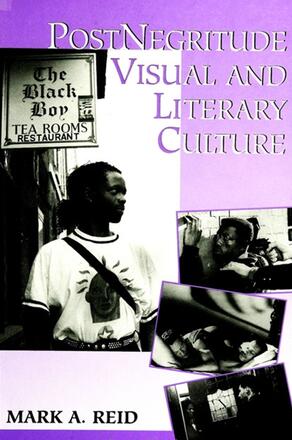
PostNegritude Visual and Literary Culture
Alternative formats available from:
Shows how film, literature, photography, and television news broadcasts construct myths about race, gender, sexuality, and nation and reinforce socialized ways of looking at these identities, and examines how some creative works and public reactions challenge these myths.
Description
In the 1960s and 1970s, the civil rights movement and other national and cultural movements fractured dominant paradigms of American identity and demanded a reformulation of American values and norms. This book borrows the moral, ethical, and political purposes of these movements to show how film, literature, photography, and television news broadcasts construct essentialist myths about race, gender, sexuality, and nation. It also examines how some visual and literary works and public reactions challenge these essentialist myths by exploring racial, sexual, and national anxieties.
Reid explains how artists such as filmmakers Julie Dash, Spike Lee, and Marlon Riggs, photographers Rotimi Fani-Kayode and Gordon Parks, novelists John A. Williams and Ayi Kwei Armah, playwright Adrienne Kennedy, and poet Bob Kaufman portray the fears of people in the grips of social and psychological change. In each chapter, he explores how an important social issue—black feminism, interracial intimacy, biracial and homosexual identity, and black erotica, for example—is presented in film, literature, and photography. Throughout the book Reid's analysis is driven by a postNegritude understanding of race and cultural identity as a socially acquired and unfixed process rather than a biological fact. By showing how visual and literary artists challenge hegemonies of power through the creative imagination, he challenges monolithic and fixed notions of race, ethnicity, sexuality, gender, religion, and cultural identity.
Mark A. Reid is Associate Professor of English and Film at the University of Florida. He is the author of Redefining Black Film, editor of Spike Lee's 'Do the Right Thing', and co-editor of Le Cinema Noir Americain, and is an editorial board member of Cinema Journal, Jump Cut, and Wide Angle.
Reviews
"Mark Reid convincingly argues that race is a social construct rather than a biological fact that is fabricated in cultural forms such as literature, film, and other modes of literary and visual representations. He develops a postNegritude philosophy to combat racism, sexism, homophobia, and other forms of prejudice, while insightfully discussing cultural forms which embody elements of a postNegritude stance, ranging from the films of Spike Lee and Julie Dash to John Williams's novel The Man Who Cried I Am to Adrienne Kennedy's absurdist play The Funny House of a Negro. Original and provocative, Reid's book helps us navigate the tricky shoals of race in contemporary society. " — Douglas Kellner, University of Texas at Austin, author of Media Culture
"I like the book's originality and the sweep of the scholarship, the groundbreaking nature of its examination of the issue of African-American representation in American cinema today, and the authority and grace with which the author makes his case. The topic is of the greatest import right now, particularly in the aftermath of the Simpson trial. I think this book will incite an enormous amount of discussion and controversy in the best sense of the word, and become one of the signal texts of African-American film scholarship in the late 1990s. " — Wheeler Winston Dixon, University of Nebraska